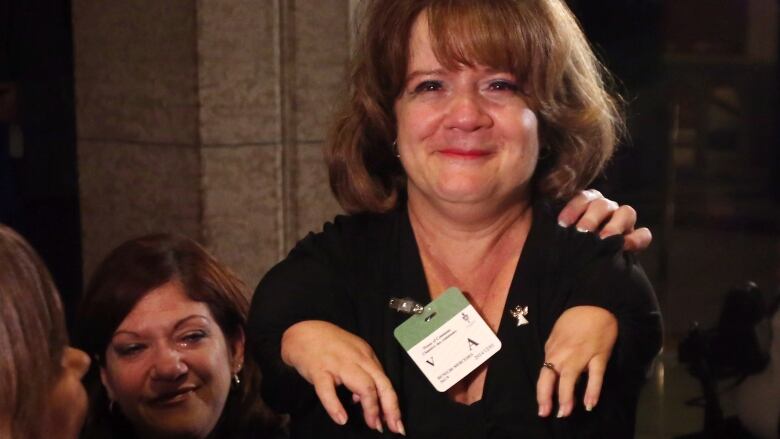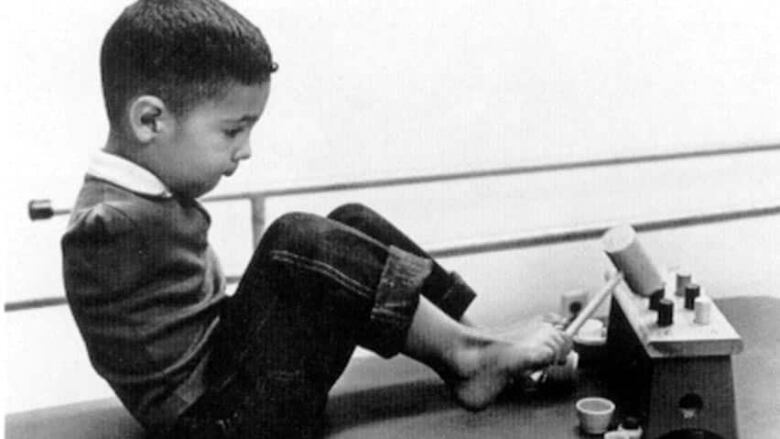Thalidomide victim says lump-sum payment not enough
'[Government's] lack of due diligence ... is what put us here in the first place,' says thalidomide survivor

A Nova Scotia thalidomide survivor says a lump-sum payment and an "ambiguous" assistance package worth up to$168-millionfrom the federal government will not cover all necessaryexpenses.
On Friday, Health Minister Rona Ambrose announced the assistance will be available for all who've suffered health effects from the drug.

The thalidomide story is still remembered as one of the most horrific health scandals in Canadian history. In the early1960s, thousands of pregnant women worldwide took the drug to combat morning sickness and insomnia.
But thalidomide caused severe birth defects and stillborn deaths.
A payment of $125,000 per person was also announced.
However, that lump sum is not as much as survivors had hoped for when parliament voted in favour of the settlement in December.
Lee AnnDalling, 52, came into this world with severe birth defects after hermother took the approved drug.
Funding announced late Friday afternoon
"It was voted upon to provide full support. We assumed that they were going to honour their promise and provide just that: full support," saidDalling, who lives in New Glasgow, N.S.
"Instead, they came back at a 4 o'clock announcement on a Friday afternoon with a half-hour notice to the Thalidomide Victims Association to tell them this is what they had finalized after making us wait over three months ... and it just came as a total blind side."
And Dalling worries the possible $168-million in assistance funding will be difficult for the 95 surviving thalidomiders to access.
"Granted there will be some things that people may be able to access that fund for like whether they needed a special bed, whether they needed a special kind of toilet, whether they needed hand controls for their vehicle or whatever," she said.
"But I basically see it as a really ambiguous pot of money that will, no doubt, be an excruciatingly long bureaucratic process to even get a nickel of it."
Dalling said the late Friday afternoon release "caught us all off guard."
"What we asked for, basically, wasn't just something we came up with. There was precedents with this and when it was presented, it was agreed at the time that it was not a negotiation," she said.
"This was the proposal. It received full parliamentary support which is almost unheard of and so when they came back late on a Friday afternoon, announcements like that are usually given when you want to hide something, not highlight something."
'A lifetime of suffering'
In many countries victims received lifetime monthly allowances as compensation.But in Canada, survivors, includingDalling, were forced to settle for a lump sum of $50,000 to $90,000 each in the1990s.
Dalling worries that the lack of clarity on how to access the additional $168-million in funding will result in delayed compensation for victims.
"Many are living below the poverty line. In addition to this ambiguous fund that [Ambrose] announced that is supposed to be administered by a third party who will probably draw more off it for administering it than any of us will ever see. Basically it's something that is so unknown, I don't see us ever able to make good use of it," she said.
"Let's not forget, [the government's] lack of due diligence in making sure the drug was safe is what put us here in the first place."
Daily life for many is full of pain and suffering, Dalling went on to say.
"It's been a lifetime of challenges, a lifetime of suffering, a lifetime of ridicule. Not to mention the parents, especially the mothers, what they went through with the guilt. Every story is a sad one and every one is different," she said.












_(720p).jpg)


 OFFICIAL HD MUSIC VIDEO.jpg)
.jpg)



























































































